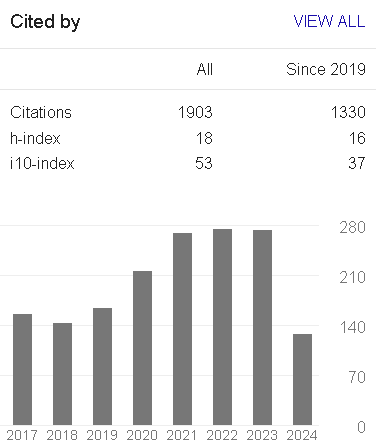Managing multi-criteria contractor selection for public construction projects in Malaysia
Keywords:
Tender selection, construction, SmartPLS softwareAbstract
Managing the selection of a right contractor for construction projects is vital for the industry because of its complexity. Furthermore, contractors have a direct impact on project’s outcome and their selection needs to be done carefully and systematically. As a matter of fact, public construction projects in Malaysia are repeatedly agonised from time over run, overspending and quality concerns. These issues are greatly affected by the contractors who are likely manipulating the tender price with the sole purpose of securing the contract, hence leading to various problems throughout the project life cycle. Thus, this paper intends to manage the contractor selection process via the aim of developing a set of contractor selection criteria for public construction projects in Malaysia. A total of 43 selection criteria are collected via literature review, questioned to 276 Malaysian construction practitioners and analysed using Statistical Package of Social Sciences (SPSS) and SmartPLS. Analysis showed that all 43 selection criteria were significant in selecting contractors in Malaysia. The findings of this paper would encourage the governing bodies and authorities to consider the use of multi-criteria assessment in selecting contractors for public construction projects, rather than being solely reliant on the tendered price.
References
Aje I. The impact of contractors’ prequalification on construction project delivery in Nigeria. Engineering, Construction and Architectural Management 2012; 19: 159–172.
Movahedian Attar A, Khanzadi M, Dabirian S, et al. Forecasting contractor’s deviation from the client objectives in prequalification model using support vector regression. International Journal of Project Management 2013; 31: 924–936.
San Cristóbal JR. Contractor Selection Using Multicriteria DecisionMaking Methods. Journal of Construction Engineering and Management 2012; 138: 751–758.
Liu L, Zhou Y, Zhu H. A conceptual framework for vendor selection based on supply chain risk management from a literature. Journal of
System and Management Sciences 2011; 1: 1–8.
Rashid I, Ismail S, Mohamed Z, et al. Contractor Selection Criteria : a Study on Malaysian Public Construction Projects. International
Journal of Engineering & Technology2018; 7: 65–70.
Nurul AJ, Aminah MY, Syuhaida I, et al. Public construction projects performance in Malaysia. Journal of Southeast Asian Research 2016; 2016: 1–29.
Shehu Z, Endut IR, Akintoye A. Factors contributing to project time and hence cost overrun in the Malaysian construction industry. Financial Management of Property and Construction 2014; 19: 55–75.
Besawa Jagar Singh BS, Abdul Hamid AR, Yahya EUB. Selection of Contractors for Minor Works by Quotation. SEPKA 2014. National Seminar on Civil Engineering Research.
Halil FM. Contractor’s perception of the use of statistical approach in the tender evaluation at the Public Works Department, Malaysia.American Journal of Applied Sciences 2007; 4: 1084–1089.
Alzober W, Yaakub AR. Integrated Model for MCDM: Selection Contractor in Malaysian Construction Industry. Applied Mechanics and Materials 2014; 548–549: 1587–1595.
Jaskowski P, Biruk S, Bucon R. Assessing contractor selection criteria weights with fuzzy AHP method application in group decision environment. Automation in Construction2010; 19: 120–126.
Puri D, Tiwari S. Evaluating The Criteria for Contractors ’ Selection and Bid Evaluation. International Journal of Engineering Science Invention 2014; 3: 44–48.
Cheung S, Lam T, Leung M, et al. An analytical hierarchy process based procurement selection method. Construction Management &
Economics 2001; 19: 427–437.
Chua S, Lin J, Ali AS, et al. Analytic Hierarchy Process DecisionMaking Framework for Procurement Strategy Selection in Building Maintenance Work. Journal of Performance of Constructed Facilities2015; 29(2).
Anderson JC, Gerbing DW. Structural Equation Modeling in Practice: A Review and Recommended Two-Step Approach. Psychological Bulletin. Epub ahead of print 1988. DOI: 10.1037/0033-2909.103.3.411.
Ramahrishnan, S., Elakkiya, B., Geetha, R., Vasuki, P., & Mahalingam, S. (2014). Image encryption using chaotic maps in hybrid domain. International Journal of Communication and Computer Technologies, 2(5), 44-48..
Hair JF, Black WC, Babin BJ, et al. Multivariate Data Analysis. Vectors. Epub ahead of print 2010. DOI: 10.1016/j.ijpharm.2011.02.019.
Shah, a., sanghvi, k., sureja, d., & seth, a. (2018). Insilico drug design and molecular docking studies of some natural products as tyrosine kinase inhibitors. International journal of pharmaceutical research, 10(2).
Downloads
Published
How to Cite
Issue
Section
License
Copyright (c) 2018 COMPUSOFT: An International Journal of Advanced Computer Technology

This work is licensed under a Creative Commons Attribution 4.0 International License.
©2023. COMPUSOFT: AN INTERNATIONAL OF ADVANCED COMPUTER TECHNOLOGY by COMPUSOFT PUBLICATION is licensed under a Creative Commons Attribution 4.0 International License. Based on a work at COMPUSOFT: AN INTERNATIONAL OF ADVANCED COMPUTER TECHNOLOGY. Permissions beyond the scope of this license may be available at Creative Commons Attribution 4.0 International Public License.


